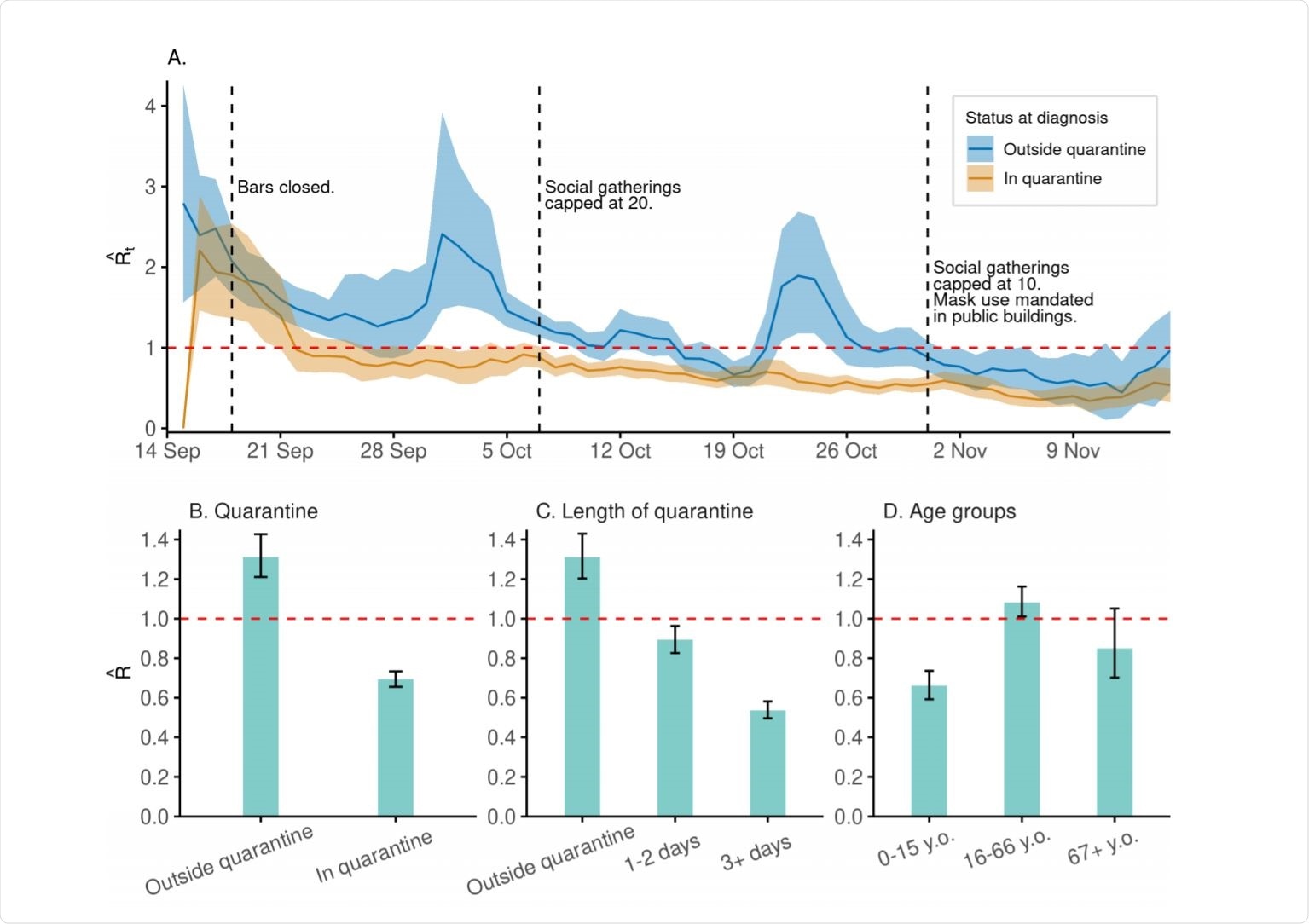Iceland has bore a relatively low COVID-19 burden compared to many other countries, with the first case of SARS-CoV-2 being confirmed in late February 2020 and a total of 6,526 people having been diagnosed with the virus as of May 14th, 2021.
Thanks to the manageable number of cases every diagnosed case was contact traced, allowing those in close proximity to enter quarantine with a PCR test upon reaching the end of the isolation period. All of those with positive PCR tests had further samples collected for sequencing of the virus, providing an unprecedented level of detail in data collection.
Three waves of COVID-19 can be traced to their origins in Iceland, with the first being introduced from abroad by several travelers, which brought multiple genetically distinct lineages. This wave was completely eliminated by May 2020 via non-pharmaceutical interventions, though the second and third waves followed shortly after, with the third in particular being larger and characterized mainly by a single genetic clade.
The transmission tree of the third wave has recently been reconstructed in a paper uploaded to the preprint server medRxiv* by Hjorleifsson et al. (June 16th, 2021), allowing a detailed comparison between demographics concerning the infectiousness of SARS-CoV-2. Further, the effectiveness of non-pharmaceutical interventions and vaccine distribution methodology is probed by computational simulation, finding that the widely accepted age descending vaccination policy may not be optimal.

Study Results. Image Credit: https://www.medrxiv.org/content/10.1101/2021.06.11.21258741v1.full.pdf

 This news article was a review of a preliminary scientific report that had not undergone peer-review at the time of publication. Since its initial publication, the scientific report has now been peer reviewed and accepted for publication in a Scientific Journal. Links to the preliminary and peer-reviewed reports are available in the Sources section at the bottom of this article. View Sources
This news article was a review of a preliminary scientific report that had not undergone peer-review at the time of publication. Since its initial publication, the scientific report has now been peer reviewed and accepted for publication in a Scientific Journal. Links to the preliminary and peer-reviewed reports are available in the Sources section at the bottom of this article. View Sources
Optimizing strategies against SARS-CoV-2
The group found that quarantine protocols significantly slowed the spread of the virus, with those diagnosed outside of quarantine being 89% more infectious than those diagnosed inside quarantine, as asserted by contact tracing and testing. As might be expected this effect intensifies with time, with those testing positive in the first few days of quarantine having had the virus well before entering, and therefore have had a chance to spread it more before isolation.
Iceland has implemented a similar vaccine distribution policy to most other nations, providing them first to the elderly and vulnerable, and then in descending age order. To optimize this strategy the group analyzed three vaccination strategies: descending age order, ascending age order, or random distribution.
Simulations that allowed iterative increases in the vaccinated percentage of the adult population from 0% or 29%, to represent frontline workers receiving the vaccine as a baseline, were run, setting the presumed probability of transmission to 40% or 10%, depending on whether an individual had received one or two doses of the vaccine, respectively. Vaccinated individuals still have a chance of catching the virus, but are significantly less likely to transmit it as they bear a lower viral load, though this was not considered in the simulation.
According to the simulations, and with all non-pharmaceutical interventions being the same, to reduce the size of the third wave outbreak to only 100 persons, 4% of the actual outbreak, 79% of all adults would need to have received a single dose of the vaccine when given in descending age order.
Vaccinating in order of ascending age, instead, would require only 64% of the adult population to have received one dose, while random distribution would require 72%. Similarly, having received two doses of the vaccine less than 60% of the adult population would need to be vaccinated in a random or ascending order strategy, being closer to 70% when given in descending order.
Therefore, after having distributed the vaccines to the elderly and vulnerable, distribution in ascending age order or even randomly would have been more beneficial to reducing transmission than age descending order. The group state that the third wave was largely spread by the young, as determined by the extensive and detailed contact tracing in Iceland, and therefore lowering transmission amongst them would have impeded the spread more strongly.

 This news article was a review of a preliminary scientific report that had not undergone peer-review at the time of publication. Since its initial publication, the scientific report has now been peer reviewed and accepted for publication in a Scientific Journal. Links to the preliminary and peer-reviewed reports are available in the Sources section at the bottom of this article. View Sources
This news article was a review of a preliminary scientific report that had not undergone peer-review at the time of publication. Since its initial publication, the scientific report has now been peer reviewed and accepted for publication in a Scientific Journal. Links to the preliminary and peer-reviewed reports are available in the Sources section at the bottom of this article. View Sources
Journal references:
- Preliminary scientific report.
Hjorleifsson, K.E., Rognvaldsson, S., Jonsson, H., Agustsdottir, A.B., Andresdottir, M., Birgisdottir, K., Eiriksson, O., Eythorsson, E.S., Fridriksdottir, R., Georgsson, G., Gudmundsson, K.R., Gylfason, A., Haraldsdottir, G., Jensson, B.O., Jonasdottir, A., Jonasdottir, A., Josefsdottir, K.S., Kristinsdottir, N., Kristjansdottir, B. and Kristjansson, T. (2021). Reconstruction of a large-scale outbreak of SARS-CoV-2 infection in Iceland informs vaccination strategies.
- Peer reviewed and published scientific report.
Hjorleifsson, Kristjan E., Solvi Rognvaldsson, Hakon Jonsson, Arna B. Agustsdottir, Margret Andresdottir, Kolbrun Birgisdottir, Ogmundur Eiriksson, et al. 2022. “Reconstruction of a Large-Scale Outbreak of SARS-CoV-2 Infection in Iceland Informs Vaccination Strategies.” Clinical Microbiology and Infection 28 (6): 852–58. https://doi.org/10.1016/j.cmi.2022.02.012. https://www.sciencedirect.com/science/article/pii/S1198743X22000854.